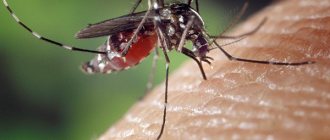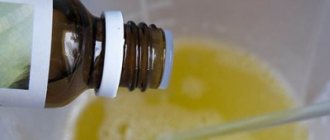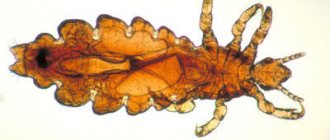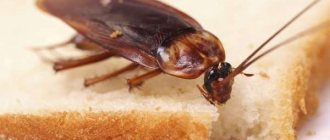Who are mosquitoes?
Mosquitoes are representatives of the Diptera family and belong to the long-whiskered group. In total, there are about 3 thousand species of these insects. In Russia there are mosquitoes of the genus biting, malarial and true, and in total more than 100 species of them are common in our country. In the city, the most widespread mosquito is the common mosquito.
Body structure
A mosquito has the following structure:
- the body is thin, no more than 1.5 cm long, colored gray, yellow or brown; the body consists of three main parts - the head, chest and abdomen;
- on the head there are antennae, divided into 15 small segments, and an oral apparatus, represented by two pairs of jaws, a tongue, numerous small teeth and a pair of lips; the lips form a kind of groove in which long needles are located; the groove of females has bristles and is somewhat longer than that of males;
- the abdomen is divided into ten segments; the last two are parts of the external genitalia, near which the anus is located; the first eight segments are connected to each other by an elastic membrane - the pleura, and each consists of two plates - ventral and dorsal, the second - sixth segments are carriers of spiracles;
- for insects of the mosquito family, the chest is the central organ to which, in addition to the head and abdomen, the legs and wings are attached; the chest itself consists of three parts: prothorax, mesothorax and metathorax; the prothorax has an exoskeleton consisting of three plates; The mesothorax consists of the same number of plates, but it is more developed and bears the anterior thoracic spiracle; the metathorax is located on the sides of the thoracic region
- the wings are thin and narrow, consisting of veins located lengthwise and transversely, along the edge of each wing is framed by a costal vein; scales are unevenly located on the surface, which form a fringe along the rear edge of each wing;
On a note! Some scientists are inclined to think that on the surface of the wings there are nerve endings, which are sensory organs!
- the legs are located on the mesothorax and their number is six; each leg is divided into a pelvis, trochanter, femur, tibia and tarsus; each paw, in turn, consists of five segments and on the last one has two claws; There is one sucker under each claw; on the inner parts of the hind tibia there are several flat spines arranged in a row.
Females and males - looking for differences
Male and female mosquitoes differ in both external characteristics and food preferences:
- female representatives feed on blood, as it is a source of protein, lipids and iron; thanks to such food, female mosquitoes are able to continue the race; after satiation, the mosquito flies to a secluded place, where it digests the extracted portion for several days, at the same time the eggs mature in its body; For males, for normal life, flower nectar, which is saturated with carbohydrates, is enough; carbohydrates in the mosquito’s body are converted into glycogen - this is the energy that the male gradually consumes during flights;
- during the act of feeding, females must pierce the dense skin, and therefore their oral apparatus is equipped with piercing needles located in the proboscis; males do not have these needles, since they simply do not need them;
- a male mosquito has longer hairs on its antennae and this is noticeable even without a microscope; they look like soft fluffy feathers; The mustache of the female half of the mosquito family is very thin and inconspicuous.
Why are mosquitoes needed?
It seems to us that mosquitoes have no other meaning in life other than to prevent us from enjoying sleep and nature. From the mosquitoes' point of view, their goal is to eat and make more mosquitoes. But does the world really need these flying bloodsuckers?
Mosquito larvae are important in the aquatic ecosystem. They form a significant part of the diet of small fish and insects (including the larvae of other species such as dragonflies). The mosquito larvae themselves feed on microscopic organic matter in the water, helping to process it. Adult mosquitoes feed on insectivores such as birds, bats, adult dragonflies and spiders. They also help pollinate some flowers. The loss of mosquitoes as a food source would likely cause the population of all consumers to decline as well.
On the other hand, mosquitoes also have a destructive role, being carriers of diseases such as malaria, yellow fever, encephalitis and dengue fever. Both people and animals suffer from them.
By the way, have you noticed that some people are bitten by mosquitoes more than others? And that's why…
What will happen if mosquitoes disappear?
Some scientists say that if mosquitoes were destroyed, the damage to nature would exceed the benefits to humanity. The disappearance of even one mosquito species can leave a predator without prey and a plant without a pollinator. Others believe the world could survive the loss of mosquitoes without too much damage. Problems may be caused by how
we get rid of them. The poisons used to kill them also kill other insects, without which the preservation of the ecosystem is impossible.
Currently, scientists are trying to breed sterile and non-viable mosquitoes in order to release them into the wild and thereby put a spoke in the wheels of the reproduction of wild individuals. This method of controlling mosquitoes is safe for other insects. But the result of these manipulations is still far from significant.
Unfortunately, science has not yet revealed all the secrets of the universe. The main problem with mosquito eradication is that we do not yet know the full truth about their role in nature. They can be useful in ways we cannot currently imagine.
From a religious point of view
When God first created the world, it was perfect. There was no illness, no crime, no suffering in him. The animals were given “every green plant for food.” That is, they were vegetarians and did not intend to bother anyone.
The mosquito's need for blood arose as a result of the Fall. The world changed dramatically with the advent of sin. Mosquitoes have become carriers of a number of diseases, contributing to the spread of malaria, yellow and dengue fever, encephalitis and many other diseases. Malaria alone affects approximately 247 million people worldwide each year and kills almost a million!
It's interesting to note that not all mosquitoes bite people or animals. The male mosquito never drinks blood, he feeds on nectar. Some species of tropical mosquitoes - both males and females - are also vegetarians as adults. In fact, there are 3,600 species of mosquitoes, of which only a couple hundred bite or bother humans.
The main purpose of insects
The benefits of flies lie in the peculiarities of their nutrition, life activity, and habitat. They involuntarily become spreaders of infection and bacteria when they come into contact with an environment that is teeming with pathogenic microorganisms.
For the development of larvae, a semi-liquid medium is required, as well as a large amount of protein. Females lay eggs on rotting, spoiled food, vegetables, fruits, decaying parts of plants, as well as meat, corpses, deep wounds on the body of animals and humans, left without proper attention. A large number of larvae of different types of flies develop in feces, garbage, garbage pits, drains, drains, and sewers.
They feed on liquid food – juices. Favorite dishes are honey, jam, syrup, ripe fruit, lemonade. In the absence of these products, they switch to more solid foods. Initially, it is treated with a special secretion - saliva, then absorbed. But most of all, blow flies bring both benefit and harm, which develop in the meat of animals, fish, and rotting human wounds.
The benefit of flies lies in the ability of their larvae to decompose tissue. Larvae are nature's orderlies. If it weren’t for these creatures, there would be decaying corpses of animals, birds, rotting plants, fruits, and vegetables everywhere. Female flies are attracted by the smells of rotting, sweat, and bacteria.
Features of mosquitoes
Male mosquitoes use their feathered antennae to sense the specific buzzing sounds of females. The mosquito produces its “buzz” by flapping its wings up to 250 times per second.
Females are looking for owners from whom they can suck blood based on the carbon dioxide and octanol they release, which are formed during breathing and sweat. When the female senses CO2 in the air, she flies upwind until she finds the source. Mosquitoes do not require blood to live, but do require proteins in the blood to lay their eggs.
Mosquitoes of the Culicidae family are found throughout the world except Antarctica, but they require habitats with standing or slowly moving fresh water to reproduce and develop.
What is the purpose of mosquitoes in Nature, what place do mosquitoes occupy in our Ecosystem? How are mosquitoes useful?
Mosquitoes can have both positive and negative effects on the Ecosystem. The beneficial role of the larvae that live in the water is that they serve as food for fish and other animals, including the larger larvae of other species such as dragonflies.
The larvae themselves consume a lot of organic matter in wetlands, helping to recycle nutrients back into the ecosystem.
Adults form part of the diet of insectivores, birds, and bats.
Mosquitoes also help pollinate some flowers when they consume nectar. Adult males feed on nectar; if they disappear, a plant such as the northern orchid may suffer.
Leading Western scientists have not yet thoroughly studied mosquitoes, so it cannot be denied that they may contain useful chemicals that are valuable for future research.
According to Dr. Gilbert Waldbauer in The Handy Bug Answer Book, mosquitoes eat the corpses of insects that drown in water, mosquito larvae feed on waste, reproducing nutrients such as nitrogen, which is necessary for the flourishing of the plant community.
Mosquitoes appear to represent a significant biomass of food for wildlife lower in the food chain. Extinction, if achievable, can have adverse effects on the ecosystem.
Although the mosquito has been a known vector of disease throughout the world, there is hope that mosquito saliva has some potential use in treating heart disease.
What are mosquitoes for?
As scientists note, annoying mosquitoes are an important link in many food chains. If they disappear, it could change our world in significant ways.
So, mosquitoes begin to be useful even before they develop into adults. The fact is that their eggs and larvae are nutritional elements for some amphibians.
Next, mosquito larvae filter water quite well: in 1 hour, one individual can pass about 1 liter of liquid through itself. In addition, they help in cleaning water bodies, as they feed on the decomposition products of animals and plants.
Moreover, mosquitoes are useful even after their death: for example, after death, adult mosquitoes enrich the soil with a large number of important microelements. Do not forget that males play an important role in the reproduction of plants - they pollinate them and contribute to their development. And for some plant predators, these insects serve as tasty prey.
In general, many people like to eat mosquitoes: for example, fish, salamanders, frogs, as well as some species of turtles and snakes will not refuse such a treat. Birds from most parts of the planet also like to snack on them - for example, in the northern regions, birds eat mosquitoes before heading south, since these insects are a source of protein
What would a world be like without mosquitoes?
Let's hypothetically imagine the extinction of all mosquitoes. The world will become different, despite the fact that these are just small insects, but their large numbers are quite important not only for nature and many living beings, but also for people.
What will happen if they die:
- The disappearance of some species of fish that feed on this type of mosquito. The most famous fish whose diet includes mosquitoes is the gambusia. She prefers to eat mainly the larvae of malaria mosquitoes. Of course, not everyone will die out, but those who survive will face the problem of having to find other food.
- Extinction or significant reduction in the population of fauna that feed on bloodsuckers - this primarily concerns toads, frogs, and bats. As a result, they need to find new objects to eat, and they will also begin to eat more butterflies and caterpillars.
- Change in flora. Many types of vegetation will disappear, since their pollination is carried out by males (remember that the diet of the bloodsucker depends on its gender). While females live off human blood, males survive on nectar. In addition, there will be a noticeable reduction in the number of vegetation that develops due to the fertilizer that appears during the life of the larvae. Despite the fact that agriculture will not be greatly affected, some of the flora may die irrevocably.
- Making life more difficult for birds. The birds will not die, but they will experience difficulties due to the need to find a new source of food. In urban environments, it will be difficult for swifts and swallows to find food, so their populations will decline. Another consequence will be that many birds will simply leave the urban area.
- Relocation of deer. Since this species of animal is afraid of mosquitoes, they stay away from places where they prevail in large numbers. And the death of bloodsuckers will lead to an expansion of the range of deer, which will negatively affect other biocenoses due to the increased load.
But the following positive points can be noted:
- Problems with certain types of diseases will be solved. Mosquitoes carry infectious diseases, and their extinction will lead to the fact that people will no longer get sick so often;
- The area available for development will be increased. Some lands are still uncultivated only because of the huge population of bloodsuckers. A person will be able to explore a new territory, but there is also a negative side - this moment will negatively affect the balance of the animal world.
Therefore, we can conclude that the role of mosquito life was determined by the laws of nature, which do not tolerate human intervention. A very important point is maintaining the existing harmony.
Benefits of mosquitoes
Mosquitoes are small blood-sucking insects that live everywhere on all continents except Antarctica. Their development from egg to adult occurs in water. The formed insect can be found in thickets of grass, parks, forests, and desert areas.
Interesting!
Females of most species of mosquitoes feed on the blood of their victims to form offspring, and males choose nectar and plant juice as their food.
Mosquitoes
Considering the wide habitat and presence of the insect in water, on land and in the air, we can analyze what role it plays in the formation of the biocenosis:
- Filtration of reservoirs. The mosquito larva, despite its microscopic size, is capable of passing through itself up to one liter per day in search of microorganisms and bacteria. Purified water becomes less suitable for the growth of dangerous bacteria.
- Nutritious food for water inhabitants. Many species of fish, amphibians, and other insects feed on mosquito eggs, larvae and pupae.
- Distribution of chemical elements. By filtering the water of lakes and swamps, insects accumulate the following useful elements in their bodies: nitrogen, phosphorus, calcium, iron, manganese, boron. Transforming into an adult, a mosquito can cross long distances and die in the forest, which so needs chemicals for development. In some areas, mosquitoes are the only transporter of useful elements of water bodies for forests.
- Mosquitoes are needed to pollinate plants. In some species, males and females feed exclusively on plant foods - nectar and plant juice. Flying from one flower to another, they carry pollen particles on their paws and proboscis, thereby promoting pollination and the development of flora.
- Food for birds and ground dwellers.
- Animal population control. As carriers of dangerous diseases, mosquitoes regulate the population size of a particular animal species. This promotes balance in the ecosystem and maintains an optimal balance between species.
The benefits of mosquitoes for humans and nature
The mosquito plays an extremely important role in nature, because it takes part in the food chain. These blood-sucking insects feed on reptiles and some microorganisms. If mosquitoes disappear, this food chain will be disrupted, leading to serious disruption to both flora and fauna.
This will have a direct impact on human life, because any intervention in nature entails very unpleasant or even disastrous consequences for the ecosystem.
Benefits from mosquitoes:
- Insects are useful at the stage of larvae and pupae - they are used as food by many amphibians, fish, and other larger insects.
- Microscopic mosquito larvae take an active part in the process of water filtration - in search of bacteria and microorganisms, they are able to pass and purify up to 950-990 ml of water over the course of an hour. In addition, the larvae feed on decay products present in the reservoir.
- Male mosquitoes feed exclusively on plant sap and nectar. During the flight between plants, they carry pollen on their paws and proboscis, pollinating them and promoting more active growth.
- Act as food for many species of birds.
- Mosquitoes are carriers of infectious diseases, which makes it possible to regulate the population size of a certain animal species.
Mosquitoes are an important link in the natural food chain
Larvae and pupae are also useful for the soil, acting as nutrient raw materials - they feed on microelements (iron, calcium, phosphorus, nitrogen, boron) available in the reservoir. In search of food, the mosquito crosses distances of up to 40-50 km, which can lead to its death.
After this, beneficial substances penetrate the soil and nourish it, promoting the active development of vegetation. In many loess areas, mosquitoes are the main “transporters” of useful components necessary for full development.
Mosquitoes also provide benefits in the field of alternative medicine. Eastern healers and healers widely use mosquito bites to treat many diseases. The essence of this technique is based on the mosquito’s ability to find a painful, weakened area and improve blood flow.
Harm from mosquitoes
Damage from mosquitoes
Mosquitoes are definitely not the most pleasant insects for humans. Their bites provoke an allergic reaction on the skin; discomfort can be replaced by severe itching, swelling, and poor health. But some types of these bloodsuckers bring real trouble - fatal diseases. The malaria mosquito is a carrier of dangerous diseases:
- malaria;
- encephalitis;
- anthrax;
- dengue;
- intestinal infections and others.
Both animals and people can suffer from malaria mosquito bites. Diseases transmitted by the Anopheles mosquito are often fatal. Deaths occur especially often in hot third world countries. The fight against the malaria vector has improved sanitary conditions in some regions. And this fact can be attributed to the presence of such a threat as malaria.
On a note!
To prevent insect damage from being so destructive, you can always use mosquito repellent. Modern repellents, mosquito nets, folk remedies and other devices significantly reduce the risk of being bitten.
Some people find the bites of common mosquitoes beneficial. This is explained by the fact that when the mosquito penetrates a blood vessel with its proboscis, it injects a special substance into the blood that prevents blood clotting. This component, according to some data, may have a positive effect on people who experience blood clots or blood thickening.
Another type of mosquito, the centipede, is a real disaster for agriculture. The adult insect itself does not have any negative impact on the garden. The damage is caused by mosquito larvae that emerge from eggs laid in moist soil. They are capable of devouring everything in their path. They often come across cultivated plants that are of great importance for the development of agriculture in the region:
- potato;
- carrot;
- beet;
- cabbage.
Mosquitoes harm people
Of these diseases, malaria alone kills more than two million people a year. In addition, mosquito bites, as a rule, cause itching, the bite site itches for a long time, allergic reactions, etc. can get pretty boring. And their thin squeak (especially at night, when it is usually more difficult to kill them manually) is a sign of nervous excitement and insomnia.
From this we can conclude that mosquitoes pose a fairly real threat to people, and if their number exceeds reasonable limits, it is worth turning this issue to specialists.
We suggest you familiarize yourself with: Tea tree for mosquitoes
What is the world like without bloodsuckers?
If we imagine a hypothetical situation that all mosquitoes have died out, then the world will cease to exist in the form in which it currently exists.
Although mosquitoes are very small insects, which can only be examined in detail under a microscope, they are numerous and play an important vital role for many living beings and even humans.
Mosquitoes
What will happen if mosquitoes disappear:
- Along with them, some species of fish that feed only on these insects will disappear. One of the most famous is Gambusia. She prefers to use malaria mosquito larvae as her main food source. Not all species will die, but those that survive will have to find other food.
- Populations of representatives of the fauna that feed on mosquitoes: toads, frogs and bats will die out or significantly decrease. As a result, they will have to look for a new object to eat and change the number of butterflies, caterpillars and other organisms.
- Changes in the plant world. Many plants will simply disappear, since their pollination occurs precisely thanks to mosquito males, because the diet of mosquitoes is directly dependent on gender. And if females need blood, then males feed on nectar. The number of representatives of the plant world, which could fully develop thanks to fertilizers after the work of insect larvae, will also decrease. This will not cause significant damage to agriculture, but certain representatives of the flora will die out irrevocably.
- Birds. The absence of mosquitoes will not cause the birds to die. But they will have to look for other options than to eat. In cities, it will be very difficult for representatives such as swifts and swallows to find food sources. Their populations will decline significantly. Birds will also have to leave urban areas.
- Reindeer relocation. These animals are afraid of mosquitoes and do not live in areas where there are a large number of bloodsuckers. The disappearance of mosquitoes will expand the ranges of deer, which will put a significant burden on other biocenoses.
- Solving problems with certain diseases. Mosquitoes are carriers of diseases: malaria, filaria larvae, etc. People will get sick and die less often.
- Increasing the development area. Some lands still remain uncultivated simply because there are huge numbers of mosquitoes living there. If they disappear, people will be able to develop new lands, which will certainly affect the balance of the entire living world.
Thus, the role of mosquitoes in human life and nature has been determined by natural laws since the creation of the world. A person should not resist them or try to change them. It is important to maintain the existing harmony.
If all the mosquitoes disappear
The assumptions of most scientists regarding the issue of the disappearance of mosquitoes on the planet are approximately the same. Of course, if insects suddenly disappear, the Apocalypse will not follow.
The main problem will be the gradual extinction of other species of living creatures for which bloodsuckers were the basis of their daily diet.
Such a scenario is unlikely. The brood of each female contains from 80 to 200 eggs. It is impossible to purposefully get rid of mosquitoes using chemicals. Modern achievements of mankind, such as repellents, fumigators, lamps, can only protect a person from the danger of a bite or malaria infection.
What will the disappearance of mosquitoes as a species lead to?
It is unlikely that the consequences will be catastrophic, but a huge number of river commercial fish and many bird species will be deprived of their usual food. The population of predatory insects that feed on mosquitoes will decrease. Water from stagnant bodies of water will have to be filtered more carefully; it is possible that small, stagnant bodies of water will become swamped.
Unfortunately, the disappearance of mosquitoes will not provide any particular benefits. Nature abhors a vacuum. In the absence of mosquitoes, another insect with the same taste preferences will certainly appear. A person who has learned to protect himself from mosquitoes does not need to make plans for their total eradication. Moreover, the basic role that blood-sucking insects play in food chains cannot be overestimated.
What is the world like without bloodsuckers?
If we imagine a hypothetical situation that all mosquitoes have died out, then the world will cease to exist in the form in which it currently exists.
Although mosquitoes are very small insects, which can only be examined in detail under a microscope, they are numerous and play an important vital role for many living beings and even humans.
What will happen if mosquitoes disappear:
- Along with them, some species of fish that feed only on these insects will disappear. One of the most famous is Gambusia. She prefers to use malaria mosquito larvae as her main food source. Not all species will die, but those that survive will have to find other food.
- Populations of representatives of the fauna that feed on mosquitoes: toads, frogs and bats will die out or significantly decrease. As a result, they will have to look for a new object to eat and change the number of butterflies, caterpillars and other organisms.
- Changes in the plant world. Many plants will simply disappear, since their pollination occurs precisely thanks to mosquito males, because the diet of mosquitoes is directly dependent on gender. And if females need blood, then males feed on nectar. The number of representatives of the plant world, which could fully develop thanks to fertilizers after the work of insect larvae, will also decrease. This will not cause significant damage to agriculture, but certain representatives of the flora will die out irrevocably.
- Birds. The absence of mosquitoes will not cause the birds to die. But they will have to look for other options than to eat. In cities, it will be very difficult for representatives such as swifts and swallows to find food sources. Their populations will decline significantly. Birds will also have to leave urban areas.
- Reindeer relocation. These animals are afraid of mosquitoes and do not live in areas where there are a large number of bloodsuckers. The disappearance of mosquitoes will expand the ranges of deer, which will put a significant burden on other biocenoses.
- Solving problems with certain diseases. Mosquitoes are carriers of diseases: malaria, filaria larvae, etc. People will get sick and die less often.
- Increasing the development area. Some lands still remain uncultivated simply because there are huge numbers of mosquitoes living there. If they disappear, people will be able to develop new lands, which will certainly affect the balance of the entire living world.
What will the disappearance of mosquitoes lead to?
It is impossible to say exactly what the complete disappearance of all mosquito species on the planet will entail. But it is possible to analyze situations that arose from the previous bitter experiences of people who interfered with the ecosystem. When a person decides for himself that he needs to get rid of this or that type of plant or animal, he is not aware of the whole picture.
Having destroyed a certain link in the food chain, nature will begin to look for a replacement for it, or will rebuild the food chain in a different way. And with great confidence we can assume that the new version of the biocenosis is unlikely to take into account all human needs. And he will again have to solve his problems by exterminating another participant in the natural system.
The destruction of mosquitoes everywhere will serve as a new impetus for changes in the food chain, and more dangerous species of insects may take the place of the already familiar mosquitoes. Their evolution and mutation will adjust to replace the missing link. But this is unlikely to suit a person. The conclusion is obvious - interference with nature entails unpleasant or even destructive consequences for all of humanity.
Balancing ecology and stability in food chains
Many people know that the squeaking mosquito is an ideal food for various species of birds, inhabitants of water bodies, dragonflies, and some animals. The larva of the presented insect is an excellent filter feeder that consumes microorganisms present inside the reservoir.
After developing into an adult (imago), the mosquito removes from the aquatic environment many microelements that are important for life, and after death, they fertilize the soil with them. It is also worth noting that male bloodsuckers pollinate vegetation.
Lifestyle
Do you know where mosquitoes live? The habitat of these bloodsuckers will depend on the following factors:
- type of insect - some are able to exist in a temperate climate, for others the most suitable place to live is tropical forests;
- location of the food source - at a certain period of life, females feed on the blood of humans and animals, and therefore they will always be in close proximity to the source of saturation;
- climatic conditions - mosquitoes do not like the cold too much and will always choose a warmer place;
On a note! The optimal air temperature for their normal existence is +16°C!
- high humidity - the most favorable place for reproduction is a place where the air humidity is in the range of 80-90%.
On a note! Scientists note the fact that mosquitoes can adapt to the most unexpected living conditions, and therefore it is possible that they will soon be able to populate Antarctica!
Life cycle of an insect
Mosquito eggs survive even in ice.
Everyone knows that harmful insects live in warm and damp places. Breeding in the basement of a multi-story building, under a leaking roof, or nestled comfortably on the walls of a ventilation shaft, mosquitoes will be a nuisance throughout the year. Natural conditions dictate their own rules, but even here the bloodsuckers were able to adapt. At what temperature does the squeaking mosquito die?
The answer may surprise you, but a sharp change in air temperature does not kill the adult (imago), but only puts it into a state of suspended animation. Eggs laid by the female are able to survive the harshest winter, freezing in the ice near water bodies.
Having spent all the cold under the snow, with a thaw and an increase in temperature to 15-20⁰C, the larva becomes a functional individual, ready for reproduction in 12-14 days. Females fly in search of warm-blooded creatures, whose blood is rich in protein necessary for breeding offspring. Males usually feed on nectar and do not bite.
Life cycle of an insect
Mosquito eggs survive even in ice.
Everyone knows that harmful insects live in warm and damp places. Breeding in the basement of a multi-story building, under a leaking roof, or nestled comfortably on the walls of a ventilation shaft, mosquitoes will be a nuisance throughout the year. Natural conditions dictate their own rules, but even here the bloodsuckers were able to adapt. At what temperature does the squeaking mosquito die?
The answer may surprise you, but a sharp change in air temperature does not kill the adult (imago), but only puts it into a state of suspended animation. Eggs laid by the female are able to survive the harshest winter, freezing in the ice near water bodies.
Having spent all the cold under the snow, with a thaw and an increase in temperature to 15-20⁰C, the larva becomes a functional individual, ready for reproduction in 12-14 days. Females fly in search of warm-blooded creatures, whose blood is rich in protein necessary for breeding offspring. Males usually feed on nectar and do not bite.
Development and growth of mosquitoes
The development of mosquitoes represents a complete cycle: egg - larva - pupa - adult. All growth phases of a mosquito are aquatic. Eggs are laid in water. Mosquitoes breed in all kinds of bodies of water: standing and flowing, temporary and permanent. Mosquito eggs easily float on the surface of the water, without fear of either rain or wind. In one approach, the female lays 100-150 eggs. The development time of mosquito eggs is determined by the water temperature and ranges from 30 hours to 9 days.
In urban conditions, the most favorable places for the development of mosquito larvae are damp and damp basements of houses. Adult mosquitoes live in the air. The lifespan of a female mosquito in summer is up to one and a half months.
Mosquito breeding
With the help of her wings, the female makes a squeak, which attracts males for mating. Males pick up these signals with the help of antennae located on them. Also, the sound largely depends on the age of the female - males flock to the sound of more mature females. Mating itself takes place in a swarm, which is formed by male mosquitoes. After fertilization, females begin to look for prey in order to get enough blood from it. After this she lays eggs. Further, the life cycle of mosquitoes consists of 4 stages:
- Egg;
The process of laying eggs
- Larva;
Mosquito larvae in a puddle
- Pupa;
Pupa stage
- Imago is an adult individual.
Adult stage
The important point is to find an area where the female can lay eggs. Most often, she chooses a stagnant body of water with an optimal water temperature. In some cases it may be wet soil. After laying eggs, mosquito larvae hatch within 2 days.
External structure
It's easy to recognize a mosquito when it lands on your hand and bites you. Most people do not pay close attention to this insect, instead trying to swat it the moment it bites. If you spend a little time, you will see that members of the Culicidae family do exhibit common traits.
Mosquitoes belong to the suborder Nematocera - true flies with long antennae. Their antennae have 6 or more segments. The male's antennae are quite pubescent, providing a large surface area for detection of females. Female whiskers are short-haired.
Mosquito wings have scales along the veins and edges. The mouth parts - a long proboscis - allow adult individuals to drink nectar, and in the case of the female, blood.
Why do mosquitoes bite some people more than others?
You've most likely noticed that some people are bitten by mosquitoes much more often. This is really not a coincidence. When choosing a victim, insects are guided by specific chemicals that are released along with sweat. Mosquitoes are attracted by the following factors:
- Doing physical activity. Here, mosquitoes pay attention to the increase in the amount of lactic acid in the body, so they actively react to people engaged in physical exercise.
- Specific blood type. Most often, mosquitoes fly to blood group 1, since it has a special smell that attracts mosquitoes.
- Alcohol. If a person has been drinking, the presence of alcohol in the blood attracts the insect.
- Large amounts of carbon dioxide. When exhaling, some groups of people release much more carbon dioxide from their lungs, which mosquitoes notice. Most often these are pregnant women, tall people, and overweight people.
- Dark shades in clothes.
The bloodsucker will tell you about your health status
When figuring out why blood-sucking mosquitoes are needed, many people are guided by stereotypes. Some citizens believe that pests carry hepatitis. But this is not true. Pus collects in the wound only if the damaged area is not treated with special lotions or alcohol solutions.
In order to understand what will happen if all mosquitoes die out, it is necessary to study the benefits of bites:
- Blood-sucking insects choose a damaged or diseased area to bite. They often consume blood from a blood vessel in which a small clot has formed.
- This therapy allows you to cleanse the blood of less useful substances and potential debris.
- People's immunity increases when they are bitten by mosquitoes.
But people who are prone to allergies need to protect themselves from bites. After all, it is difficult to get rid of their consequences. This may require medications or special ointments.
Where do flying pests most often bite?
A group of people vacationing in the country often notice that blood-sucking insects do not attack everyone. Those adults and children who eat natural foods and spend a lot of time in nature do not suffer from bites. After 7–14 days, people emit an odor that is unattractive to pests. This is why mosquitoes and midges do not react to avid summer residents. Manufacturers of protective equipment also take advantage of this property. They use natural repellents and substances that repel pests and help reduce the likelihood of an attack.
Before attacking, mosquitoes carefully choose a place to bite. When selecting, insects pay attention to certain points:
- Those places from which the rich aroma of lactic acid emanates.
- Purity of blood. If a person eats properly and does not consume harmful foods, then insects rarely attack him.
- Muscle condition. The mosquito looks for areas with damaged muscles or damaged epithelium.
Experts recommend making adjustments to the diet of those people who are attacked by pests.
Mosquito therapy in Chinese medicine
Chinese practitioners know exactly why mosquitoes exist in this world. The blood-sucking insect consumes not only blood, but also cleanses energy channels. After all, negative energy that is present in the human body comes out through the holes. Chinese craftsmen carry out a similar procedure, using special needles for this purpose. If the injection points are correctly identified, then the person’s condition improves.
You need to know about the importance of blood-sucking insects in nature. After all, some people carry out mass extermination of mosquitoes. And they don't think about the harm they cause.
What can a bite lead to?
Among the main symptoms that occur in victims after a bite are:
- Possible appearance of slight swelling, which subsides after a few hours;
- Itching - it appears due to the saliva that the mosquito secretes, but it will not last long if you apply ice to the affected area or treat it with an antiseptic;
- Mosquito bites in exotic countries can lead to infection, so make sure to get vaccinated in advance.
Most people, when answering the question of why bloodsuckers are needed, rely on stereotypes. Some citizens think that such insects are capable of transmitting hepatitis, which is completely false. Collection of pus in the wound can only be collected in cases where the area on the skin has not been treated with special lotions or an alcohol solution.
In order to better understand the consequences of the extinction of bloodsuckers, you need to understand the benefits of a bite:
- The blood-sucking animal selects damaged or diseased areas of the skin to bite. They often consume blood from vessels where small blood clots have formed;
- Mosquito therapy makes it possible to cleanse the blood of unhealthy components;
- A person's immunity is increased if he is bitten by a mosquito.
If you suffer from allergic reactions, it is imperative to provide protection, since the consequences may become irreversible. As a method of protection, you can use a medicine, a special ointment or spray.
Importance for nature
The role of mosquitoes in nature is much more significant than it might seem at first glance. This small insect takes an active part in many important processes:
- Living most of their lives in water, they accumulate in their bodies a huge amount of important trace elements, minerals and beneficial bacteria, which, after the death of the insect, end up in the soil, enriching and fertilizing it;
On a note! From this point of view, mosquitoes become especially important for the taiga, where they are sometimes the only ones who transfer microelements from swamps to the soil! Every year, these small insects carry about 16 kg of nitrogen, 9 kg of phosphorus and 6 kg of calcium on their tiny legs!
- in the form of pupae, larvae and adults, they are food for many species of fish, birds, animals and large insects; In this way, mosquitoes maintain the stability of their food supply;
- Feeding on plant nectar, they participate in the pollination process, spreading pollen on their legs, wings and proboscis.
Surprisingly, such a simple and sometimes dangerous mosquito actually brings enormous benefits to nature.
What benefits do mosquitoes bring?
Any mosquito is your personal free little doctor, perhaps without a white coat, who detects your diseases before you begin to suspect them. Please note that the mosquito does not immediately bite, it chooses a place to bite where the “bad blood” is. He selects the location of the bite by “smell” (uric acid or sweat, the smell of which can be heard within a radius of 3 km). And the sore spot “smells” the most. That's what the mosquito finds. By the way, if you mentally ask a mosquito to bite it, it most often flies away. It even becomes offensive: after all, he asked. If we speak in the language of Chinese medicine, then mosquitoes and other “acupuncture” living creatures clean out energy channels, giving an outlet to stagnant energy. Mosquitoes simply sense such places. So, for example, today I was walking through the forest in the warm rain and my legs were covered with mosquitoes, rushing at speeds of up to 3 km/h. I allowed them to refuel, and, to be completely sincere, to clean myself: a year ago I got rid of a tumor in one day on a knee from 20 years ago (they simply blocked it and it resolved within a week). Today I experienced even more: having opened the channels, the cells on my legs, first my feet began to tingle, and then I suddenly wanted to run and empty my stomach! The call was clear. I realized how many different unnecessary things had accumulated in me and the mosquitoes let me feel it... A person’s sore spot always radiates more heat, because... It is in this place that the body accumulates energy and pumps blood to get rid of toxins. Insects feel this. Mosquitoes hardly bite some, while others are simply covered from head to toe: there is much more work to do with a slagged body. Also with the natives, who are almost never bitten, because... they feed on what grows here, i.e. merge with nature. In addition, insects maintain ecological balance in the forest. In the taiga region, a significant part of the cycle of substances occurs thanks to mosquitoes. From 100 hectares of swamp, 30 kg of carbon, 15 kg of nitrogen, 10 kg of phosphorus and 6 kg of calcium “fly away” annually. Thus, the swamps lose their destructive effect on the forest. Flying out of reservoirs, mosquitoes die on land, fertilizing the soil. For 1 km2 of forests and meadows adjacent to the reservoir, there are up to 500 kg of this excellent organic fertilizer. Vital trace elements - cobalt, manganese, iodine, iron and gold - are transferred from water to land. And, of course, the mosquito takes a decent part of the work of pollinating flowers in the taiga and tundra on its fragile wings... And a little more information about mosquitoes. The characteristic sound we hear is how females attract males. Female mosquitoes use blood to produce eggs because human blood contains some of the proteins needed for reproduction. More blood means more eggs. Actually, mosquitoes usually feed on nectar, with the exception, of course, of females.
Animals
Bats hunt mosquitoes. Watching these animals during their hunt, you can see how they quickly glide back and forth, catching insects.
Reindeer migrations depend on mosquitoes. Pests drink up to 300 ml of blood from one deer per day. Animals often change their location so that many blood-sucking insects do not accumulate around them.
The mosquito drinks the blood of all animals. An insect attack brings a positive effect: after loss, new blood is produced, healing the body.
Disease notification
Biological scientists have deciphered the mechanism that signals the presence of human diseases, the basis of which is the observation of mosquitoes - this process makes it possible to:
- Determination of weak points and human organs;
- Identification of a specific atmospheric phenomenon that will prevail in a given season;
- Accelerating the human healing process;
- Notification of necessary adjustments in the body to deliver nutrients to the required organs.











